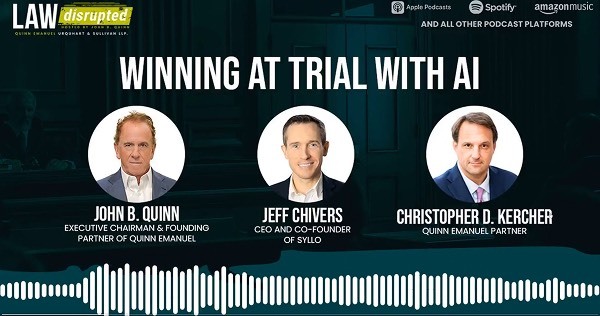Syllo CEO and Co-Founder Jeffrey Chivers was featured recently in a three-part podcast series with Brandon Renken, a partner at Mayer Brown, a premier global law firm. Brandon is a highly accomplished trial lawyer with considerable courtroom experience, known for his work on complex commercial disputes in both state and federal courts. He has been recognized as a Super Lawyers “Rising Star” and also named to Houston Business Journal‘s “40 Under 40.” Jeff and Brandon engage in a substantive and candid discussion about Jeff’s unique career path, his motivations for founding Syllo, and how attorneys can mitigate risks typically associated with AI.
The first part of the series, AI Pioneer, explores the origins of Syllo, tracing Jeff’s path from his time in college to his unconventional journey through his early years in practice. Jeff recounts his experiences living in Taiwan, cutting his teeth as a litigator at a small litigation practice, and clerking for federal judges, where he and co-founder Theo Rostow first recognized the early signs of a technological shift.
The second part of the series Greater Efficiency in Litigation is a Public Good, shifts to the core motivations behind Syllo’s mission, the growth we have made as a company, and the confirmation the market is ready for a unified platform that rethinks traditional workflows. The discussion turns to the “dis-alignment” often seen between the merit of a lawsuit and its outcome, which, in complex litigation, typically stems from one party’s ability to marshal more attorney time than its opponent. Building greater efficiency without sacrificing quality, then, would be a public good, leveling the playing field and making the merits of cases more determinative of litigation outcomes.
Finally, in part 3 Unlawful Podcast: The Things About Hallucinations, the discussion turns to the critical topic of AI and a commonly perceived challenge: hallucination. Jeff explains that earlier versions of large language models generated outputs without reference to any legal database or source of truth. However, large language models can be integrated into applications that include such databases. This enables them to identify requests for factual information at the outset and query a database to provide a sourced response. The series concludes with a shared vision for a future where AI empowers litigators to focus on strategy, a future that is not just theoretical but actively being built today.





